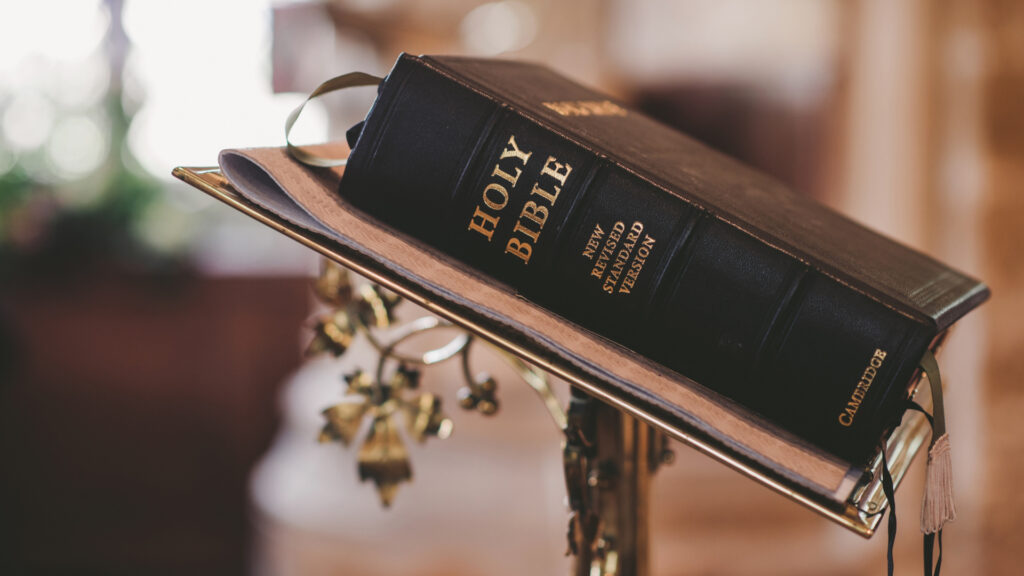Posts by reachchurch
Don’t Stop Believing
Read This Week: John 20
Thomas said to them, “Unless I see the nail marks in his hands and put my finger where the nails were, and put my hand into his side, I will not believe.” A week later, his disciples were in the house again, and Thomas was with them. Though the doors were locked, Jesus came and stood among them and said, “Peace be with you!” Then he said to Thomas, “Put your finger here; see my hands. Reach out your hand and put it into my side. Stop doubting and believe.” – John 20:25-27 NIV.
This chapter of John captures the different appearances of Jesus after He rises from the dead. He miraculously appears to Mary Magdalene, two disciples on the road to Emmaus, Peter, and the Apostles, including a decisive moment on the shores of Galilee. Christ also appears to the Apostles again, but this time one of the disciples is present that wasn’t there on Sunday evening. When the follower, Thomas, heard that Jesus had appeared to them before, he didn’t believe it. He said he couldn’t believe it unless he saw the wounds in Jesus’ hands and the wound on His side.
Then Jesus showed up again and said to Thomas, put your finger here; see my hands. Reach out your hand and put it into my side. Stop doubting and believe. Stop doubting and believe. As human beings and imperfect followers of Jesus, we have moments like Thomas. Our doubt can lead to an assortment of distractions and paths that lead us away from God. But the Lord loves us so much that He gives us the same wake-up call to examine ourselves and our faith. He stands with us in a room and calls us back to the scars on his feet and hands to remind us of His sacrifice, grace, mercy, sovereignty, and power.
Like when we get a little too full of ourselves, self-sufficient, or desirous of the praise and notoriety that God alone deserves, something inevitably happens that says, stop doubting and believe. We didn’t bring anything into this world and won’t take anything out of it, so we must not allow doubt in who God is to make us arrogant and prideful. We must allow faith to humble and mature us.
When mistrust in the Father leads us to get a little too pious, self-righteous, or judgmental, God says, stop doubting and believe. We’re human and were once dead in sin before we placed our faith in Christ, so we must not allow doubt to make us like Thomas or the Pharisees. We must enable faith to give us the trust and acceptance of a submissive child.
When suspicion about our identity in Christ leads to self-consciousness, insecurity, and a lack of significance, Jesus says, stop doubting and believe. We are made in His image with meticulous care to love, worship, and be in a relationship with Him. We must not allow doubt to make us feel worthless and unimportant. We must allow faith to remind us of our place as children of God and heirs to His throne.
Doubt doesn’t equal no faith, but it can have a negative impact on all the blessings and spiritual benefits that come with our relationship with God through Christ. Faith is not absent in doubt, but it is much better. It empowers us to place a greater value on what is eternal instead of squandering too much on secular values that decrease valuable margin and prevent intimacy with Christ. Faith incites humility and helps us seek help to sure up blind spots that plagued Thomas and every Christian. Faith recalls God’s promises when faced with uncertainty and is the best answer to anxiety. Faith remembers the resurrection and the victory that we experience every day. Stop doubting and believe.
No King But Jesus
Read This Week: John 19
Here is your king,” Pilate said to the Jews. But they shouted, “Take him away! Take him away! Crucify him!” “Shall I crucify your king?” Pilate asked. “We have no king but Caesar,” the chief priests answered. Finally, Pilate handed him over to them to be crucified. – John 19:14-16 NIV
The former American evangelist Dwight L. Moody once said, “Death may be the king of terror, but Jesus is the King of kings.” This statement is relevant to the context of John 19 because it was indeed a terrifying scene. Jesus has been arrested and unjustly tried, and now Pilate has ordered him whipped, beaten, and his soldiers pressed a crown of thorns a half an inch into his scalp. He was hours from being put to death in the most gruesome and brutal of ways, and his followers had scattered to the wind in fear. It was terror, and death was imminent, but Christ was King, and his life was eternal.
In this passage, Pilate brings Jesus before the people for their evaluation. He was mocking the Lord and the Jews by presenting this savaged man with a robe across his bloody body as their so-called champion. It was Pilate’s way of saying to them that this was no king, but simply a misunderstood zealot who could be beaten into submission by the Roman government. Little did Pilate know that the authority he had to have Christ punished was given to him by Jesus Himself (v.11). Ironically, he was actually presenting the true King.
The crowd didn’t get it either. The multitude saw Jesus standing before them in all His misery and didn’t see kingship, eternal royalty, supremacy, and power. They saw someone who pushed the envelope too much with his claims and teaching and paid for it with severe consequences. They didn’t consider his supernatural acts, compassion, or heavenly wisdom. They didn’t look beyond their preconceived notions of what a king should look like. So they didn’t say crown him, but instead said take him away, take him away! Crucify Him! (v.15)
Finally, Pilate gives the people one last chance to acknowledge Christ as King. He says almost facetiously that surely they didn’t want to crucify their king (v.15). But angrily, the mob makes it clear that they think nothing of Jesus’ exalted position. They defiantly shouted back the rejection of Christ to the Roman governor, and their leaders added that they had no king but Caesar. They disregarded the sovereign, eternal ruler of the universe to swear allegiance and pay homage to a fallible and finite man who was oppressing them.
The most incredible thing about this profound and layered chapter is that Jesus is King the whole time. He was King when he was arrested, unfairly tried, ridiculed, beaten, and denied. He was King when Pilate humiliated Him, his followers abandoned Him, and the Jews rejected Him. He was King when He carried his cross, when the soldiers gambled over his clothes, spat on him, and viciously offered him sour vinegar when He said he was thirsty. He was King when they drove the nails, raised the cross, and stabbed his side to ensure he was dead. No matter what they said, did, or caused Him to suffer, Jesus was King.
The same is true of Christ still to this day. He is King. He is King when the world rejects Him and His disciples. He is King when skeptics try to disprove He ever lived. He is King when His name is taken in vain and worked into jokes and punchlines. He is King when things are falling apart, and all seems lost. He is King amid uncertainty, disease, heartbreak, and pain. Through His kingly power, He saves, heals, redeems, calms, and makes things right. He always has and always will. Nothing can stop Him. There is no King but Jesus.
Undeniable
Read This Week: John 18
The other disciple, known to the high priest, came back, spoke to the servant girl on duty there, and brought Peter inside. “You aren’t one of this man’s disciples, too, are you?” she asked Peter. He replied, “I am not.” It was cold, and the servants and officials stood around a fire they had made to keep warm. Peter also was standing with them, warming himself. – John 18:16-18 NIV
Denial is one of the classic defense mechanisms, or a psychological strategy often used unconsciously by people to cope with a harmful or stressful situation. By definition, denial happens when an individual refuses to recognize or acknowledge objective facts or experiences. Psychology Today claims that it is an unconscious process that protects the person from discomfort or anxiety. All of this is a lot of fancy language for the inability to face the truth or its consequences.
Spiritually speaking, denial is the unwillingness to accept what is real and true. It comes from our sinful nature and the propensity to look out for ourselves and seek the preservation of self above all. It doesn’t matter who we are or where we’re from; we react similarly when our well-being, reputation, or interests are threatened. Denial can negate sensibility, confidence, and determination among the boldest people, bringing us to the disciple Peter in John 18.
Peter gained a reputation among the disciples as the reckless one full of passion and zeal for the way of the gospel and Jesus in particular. He was known to make audacious claims about his loyalty to Christ and his willingness to follow the Lord into death. Jesus often countered these assertions, and the fiery disciple would often be left humbled by a rebuke or a gentle exhortation. No admonishment after a bold claim by Peter is starker and more cringe-worthy than the one that plays out in this chapter. At the Lord’s Supper, after Jesus predicts that someone will betray him, the following occurs:
Peter replied, “Even if all fall away on account of you, I never will.” “Truly, I tell you,” Jesus answered, “this very night before the rooster crows, you will disown me three times.” But Peter declared, “Even if I have to die with you, I will never disown you.” And all the other disciples said the same. (Matthew 26:33-35 NIV)
John then records the accuracy of Jesus’ prediction and the sobering moment for Peter and all of us in this passage. Peter has already denied that he is a follower and disciple of Christ two times outside of where Jesus is standing trial and then inexplicably does it again. Verse 27 says: Again Peter denied it, and at that moment, a rooster began to crow.
This scene is brutal for the passionate disciple and one from which we can all learn. It reminds us that it is more important to be strengthened in our faith and resolve than in our claims about piety. It shows that our good intentions are nothing more than that if we do not ask God for the ability to follow through. It demonstrates that while passion and emotion are natural and necessary components of our walk with God, they are not more valuable than spiritual discipline and devotion.
The beautiful end to the story is that Peter was redeemed and forgiven. After he saw Jesus post resurrection, he went on to proclaim the gospel with bravery and power that shook a continent for Christ. That’s because the glory of God and the advancement of the gospel is undeniable even when people try to deny it.
May the Holy Spirit empower us with the courage to stand up for Jesus and be counted with those who are called by His grace to serve and live for Him. May we choose affiliation with righteousness than fellowship with darkness. May God strengthen our hearts and guide our words in this day and age to express faith in moments when it would be easier to stay quiet.
Prayed For
Read This Week: John 17
I also pray for those who will believe in me through their message, that all of them may be one, Father, just as you are in me and I am in you. May they also be in us so that the world may believe that you have sent me. I have given them the glory that you gave me, that they may be one as we are one—I in them and you in me—so that they may be brought to complete unity. Then the world will know that you sent me and have loved them even as you have loved me. I have made you known to them and will continue to make you known in order that the love you have for me may be in them and that I myself may be in them. – John 17:20-23 & 26 NIV
It is a humbling thing when someone says they will pray for us. It is very meaningful when another person takes the time right there or later to specifically pray for our lives, needs, hurts, families, and requests. Praying or interceding to God on behalf of another is a reasonable, practical, and powerful way to express love and care and to see the Lord do supernatural things in their life. The spiritual discipline of prayer among the family of God and toward those far from Him is a beautiful gesture of the Father’s heart and an effective
In John 17, the Savior Himself prays for His disciples and prays for us, His followers. It is one thing to be prayed for by another person, but it is another thing altogether to be prayed for by Jesus Christ. The context in which He is praying makes this prayer by Jesus even more meaningful. He is in the garden just minutes before his arrest, trial, beatings, and crucifixion. However, in these difficult moments, the Lord is submitting to the will of the Father and is praying for His disciples and all those who will call on the name of the Lord after them. In this most pivotal of hours, Christ is praying for us. Verses 13-19 say:
I say these things while I am still in the world so that they may have the full measure of my joy within them. My prayer is not that you take them out of the world but that you protect them from the evil one. Sanctify them by the truth; your word is truth. For them, I sanctify myself, that they too may be truly sanctified.
This idea of standing firm in the world and being real is what Jesus was praying for his followers. Sancitification and holiness is what he desires for us in this present day. He didn’t pray for us to be good at Christianity; he prayed for us to be faithful and obedient. His sincere prayer is for us to follow him authentically. He said:
They do not belong to this world any more than I do. Make them holy by your truth; teach them your word, which is the truth. Just as you sent me into the world, I am sending them into it. And I give myself as a holy sacrifice for them so they can be made holy by your truth. I am praying for these disciples and all who will ever believe in me through their message.
Jesus prayed for us to live authentically as people who belong to Him and not the world. Authentic Christianity results from the right relationship with God and his truth. When we live like Jesus prayed and take on his authentic nature, we won’t blame others for our sinful attitudes and personal discontentments. We won’t privately complain that we aren’t being encouraged while failing to encourage. We will lend a hand more than we hold it out. We will pray more than we question. We will value the gospel mission above our egos. We will be present and passionate on the journey and contribute to unity, not frustration. We will trust God amid our struggles, doubts, and challenges.
Christ knew what we would need. He knew right there in the garden what each of us would need in 2023 as His disciples. He knew our hearts and every weakness and shortcoming that He alone could bolster, strengthen, and preserve. So as we move into a new year, we can have joy, hope, confidence, and access to the same Jesus that knelt and prayed for us long before we ever took our first breath.
He Has Overcome
Read This Week: John 16
“Do you now believe?” Jesus replied. “A time is coming and has come when you will be scattered, each to your own home. You will leave me all alone. Yet I am not alone, for my Father is with me. “I have told you these things so you may have peace in me. In this world, you will have trouble. But take heart! I have overcome the world.” – John 16:31-33 NIV
John 16 is a gripping and suspenseful chapter for the disciples. Jesus tells them what life will be like when ascends back to the Father, leaving them on earth to carry out His mission. He does not sugarcoat it for them and says they will suffer persecution and opposition from the authorities and religious leaders and experience grief, unlike anything they’ve dealt with. The Lord is preparing their hearts for the glorious ministry of the gospel and warning them that there will be a cost to proclaiming and living out God’s truth.
But Jesus doesn’t foreshadow all this without a promise of His presence and power. He tells them in verse 7 of sending an Advocate, the Holy Spirit, to guide their lives and ministries. Verses 13-14 lays it out like this:
When the Spirit of truth comes, he will guide you into all the truth. He will not speak on his own; he will speak what he hears and tell you what is yet to come. He will glorify me because it is from me that he will receive what he will make known to you.
The Savior also assures them of His sustaining presence by giving them what they need for the journey. All they have to do is ask in His name, and Father God will provide. He declares in verses 23-24 that the Father will give you whatever you ask in my name. Ask, and you will receive, and your joy will be complete. The assurance of God’s spiritual provision was a pledge to give the disciples and all other followers of Jesus joy and peace when everything around them would suggest otherwise.
And these are the promises and affirmations that God gives us today. As we read this passage, we are in front of Jesus as he taught and encouraged His followers. We relate to his prediction that suffering and trials would come and experience comfort when He said our sorrow turns to joy. We find inspiration in His promise that the Holy Spirit is active and will be our Helper at all times. We find boldness in His proclamation that truth will always guide the way. Most importantly, we are lifted by the hope that Christ has overcome it all. His resurrection power has overcome the fallenness that invades and plagues this life.
He has overcome relational discord. He has overcome hunger and poverty. He has overcome politics and in-fighting. He has overcome senseless violence. He has overcome disease, depression, and shame. He has overcome tragedy and confusion. He has overcome sin. Take heart; he has overcome the world. It was true that day in the first century. It is true today at the end of 2022 and will be true in the future. He has overcome.
The Whole Story
Read This Week: Luke 2
So Joseph also went up from the town of Nazareth in Galilee to Judea, to Bethlehem the town of David, because he belonged to the house and line of David. He went there to register with Mary, who was pledged to be married to him and was expecting a child. While they were there, the time came for the baby to be born, and she gave birth to her firstborn, a son. She wrapped him in cloths and placed him in a manger because there was no guest room available for them. – Luke 2:4-7 NIV
Christmas often gets the greatest attention. It is the most palpable time of the year for the believer in Jesus and those who claim no religious affiliation. Easter is widely celebrated, to be sure, but it is not on the level of the Advent season in terms of acceptance and observance. People worldwide will sing spiritual songs, be more generous than at any other time, and even attend a church gathering where the message of salvation is shared and the Scriptures are read. One such Scripture is Luke chapter 2. This passage can be quoted by the secular and sacred alike. For some, it will be the only biblical passage they will ever hear.
This is an interesting fact about Christmas and these Bible verses because Luke writes the longest Gospel and most extended narrative in the New Testament. Yet, he describes Jesus’ birth in straightforward, short terms. In chapter 2, twenty verses cover the incarnation and its surrounding events. However, starting in chapter 22 with the betrayal by Judas, the author dedicates three chapters and one hundred seventy-nine verses to the death, burial, and resurrection of Christ. Perhaps this tells us something about the overall narrative of God.
It could be that we are careful not to treat the birth of Christ as if it were the beginning. If we see Jesus’ birth as just the start of the Savior, then we will miss the significance of what the Lord ordained in eternity past and what He did after Bethlehem. Jesus’ birth is not merely the opening of the story. It’s a supernatural occurrence within it, a pivotal moment in the complete story of God. It was the time in the metanarrative when Immanuel was with us; therefore, the virgin birth cannot be contained to a moment in history. It is a moment for eternity.
Seeing Christmas in light of the whole story of God makes it more joyous, promising, and hopeful. It isn’t just joy for a short time; it is joy complete in Christ for all time. It isn’t just peace on earth for a sliver of a moment but eternal peace in heaven. It isn’t just a promise for one day; it is a promise for every day. It isn’t just hoping for a season; it is hope forever. So let’s give Christmas the attention it deserves as an impactful moment in the grand narrative of God’s glory and redemption.
The Vine
Read This Week: John 15
I am the true vine, and my Father is the gardener. He cuts off every branch in me that bears no fruit, while every branch that does bear fruit he prunes so that it will be even more fruitful. You are already clean because of the word I have spoken to you. Remain in me, as I also remain in you. No branch can bear fruit by itself; it must remain in the vine. Neither can you bear fruit unless you remain in me. I am the vine; you are the branches. If you remain in me and I in you, you will bear much fruit. – John 15:1-5 NIV
We don’t have to do this alone. The great thing about walking with God in life and on a mission is that He provides strength and power for us no matter where we are on the journey. No more excellent word picture in the New Testament shows God sustaining us with spiritual power than the vine and branches in John 15. The imagery of Christ as our lifeline and source of spiritual and emotional sustenance is profound and practical.
Jesus is the vine that gives us nourishment or the ability to grow, while God, the gardener, constantly shapes and changes us. We need this connection. We can’t bear spiritual fruit by ourselves as much as we would like to think we can. Without this connection to Father God through Christ, we can do nothing that glorifies Him. But with this connected relationship, even the down times can be sacred, and the tiny life decisions impactful. Jesus reiterates this in verse 4: No branch can bear fruit by itself; it must remain in the vine. Neither can you bear fruit unless you remain in me.
Coming to grips with our need for God is not easy to admit in our lives or leadership, but it is necessary for growth. It is also key to maturing as we spiritually develop and lead others to do the same. Honesty is at the heart of a successful Christian life and service. A transparent approach brings a commitment to the areas we need to grow and accept responsibility. If we do, the results can be exponential on earth and reverberate in eternity. Verses 5-6 encourage us like this:
If you remain in me and I in you, you will bear much fruit; apart from me, you can do nothing. If you do not remain in me, you are like a branch that is thrown away and withers.
We all need inspiration, direction, and spiritual energy in the minor and major things. Sometimes, just getting through the day requires a spiritual lift. But God can sustain us in our strength and help us in our weakness if we abide in him. Then, after we are filled and nourished by Him, the Lord can use us to accomplish great things for His glory while the world will recognize something different about us and be changed. He says in verse 8 that it is for my Father’s glory that you bear much fruit, showing that you’re my disciples.
The Best Part
Read This Week: John 14
Do not let your hearts be troubled. You believe in God; also believe in me. My Father’s house has many rooms; if that were not so, would I have told you that I am going there to prepare a place for you? And if I go and prepare a place for you, I will come back and take you to be with me so that you also may be where I am. I am the way and the truth and the life. No one comes to the Father except through me. – John 14:1-3, 6 NIV.
A pastor once stood up at a funeral to memorialize a longstanding church member. The former congregant was a respected person in the community and the church. He had been a devoted husband, Father, brother, and friend. He lived a good life, positively impacted people, and served others in ministry and the marketplace. Many people attended his funeral to pay their respects and support those closest to him. When the time of the eulogy came, the pastor walked to the podium, said a few opening remarks, and then read these verses:
Jesus said, Do not let your hearts be troubled. You believe in God; also believe in me. My Father’s house has many rooms; if that were not so, would I have told you that I am going there to prepare a place for you? And if I go and prepare a place for you, I will come back and take you to be with me so that you may be where I am.
And then he stopped right there. The minister didn’t go any further. In his attempt to offer hope to family and friends about the eternal destination of their dearly departed loved one and to offer the same to the listening audience, he left out the best part. He omitted the part of the passage that ties everything else together, that makes the promise of heaven in the presence of God possible. He inexplicably disregarded verse 6: I am the way, the truth, and the life. No one comes to the Father except through me.
The best part is that Jesus is the way, the truth, and the life. That’s the central message of the Gospel. Without verse 6, nothing else has veracity or promise. Without the best part, eternity loses its assurance, and life loses its meaning and purpose. Without verse 6, hope beyond the grave is just an optimistic thought of a dreamer. Without the best part, life is nihilistic at worst and whimsical at best. If Jesus is not the way, the truth, and the life, then no one is coming to the Father, and the expectation and joy of an eternity in God’s presence would not lend beauty and meaning to a life lived for Him.
The best part of the story is that we can know Jesus Christ and have a relationship with God. Without its reality and power, we don’t get the infinite enjoyment of the Father’s House. Without the sureness and authority of verse 6, the place He speaks about in verses 2-3 will not be there. The certainty and capacity of Jesus’ words, let us know that He is coming back. This fact is how we don’t let our hearts be troubled.
Jesus is the way, the truth, and the life. Life is in Him, and He has gifted that life to us. Jesus is the source of the light of this life and the author of eternity. He spoke the words of life and said we might have it more abundantly. Through Him is communion with Almighty God. He is the truth and the only way. Verse 6 is the best part. Please don’t leave it out.
Foot Washers
Read This Week: John 13
Jesus got up from the meal, took off his outer clothing, and wrapped a towel around his waist. After that, he poured water into a basin and began to wash his disciples’ feet, drying them with the towel wrapped around him. After washing their feet, he put on his clothes and returned to his place. Now that I, your Lord and Teacher, have washed your feet, you also should wash one another’s feet. I have set an example that you should do as I have done for you. – John 13:4-5; 12-15 NIV
Of the many things He was throughout his ministry, Jesus was most certainly a servant leader. He frequently demonstrated remarkable humility and meekness for His followers and us to emulate and do likewise. Jesus had equal status with God but didn’t think so much of himself that He had to cling to the advantages of that status no matter what. Not at all (Phil. 2:6). Jesus was God, yet He never flaunted or leveraged that divine privilege; in fact, He went out of his way to be an example of servanthood to those from every walk of life.
One of the most famous and compelling examples of Jesus’ sacrificial love and service to others occurs in His final moments with the disciples when He washes their feet at the Last Supper. All four Gospels describe the events of this night, but only John 13 includes the powerful imagery of the foot washing. This passage tells us that Jesus gets up from the table without speaking and begins to wash the dirty feet of his disciples. A lowly, humbling act for anyone, much less the Savior who enjoyed sovereignty over all the earth.
Christ demonstrates the coming sacrifice of His body and blood on the cross with the bread and wine and then displays the transcendent humility it would take to offer himself up. The fact that this was a final moment of fellowship with His closest followers and that He had total authority makes this even more significant. Jesus wanted this lesson of service, grace, and love to be a lasting memory and a sustaining force in their lives and ministries. He says in verse 14:
Now that I have washed your feet, you also should wash one another’s feet. I have set an example that you should do as I have done for you.
God wants this for us too. He desires us to be undergirded with humility and grace and postured with a servant’s heart. Following His example, we should not consider ourselves better than anyone or above any act of service that would bless another. It takes tremendous self-denial to bend down and wash another person’s feet. It is so stark in its servility that it provides a gleaming illustration of what should embody a Christ follower’s life in the world. We are foot washers, not glory seekers.
This compassion, attitude, and behavior are who we should be and how we should behave among people. We should be ready to love them in such a way that we can bend down and serve at the greatest levels of self-sacrifice. It is how they will know we follow Christ. Jesus says in verses 34-35: A new command I give you: Love one another. As I have loved you, so you must love one another. By this, everyone will know that you are my disciples if you love one another.
Easy Thank You
Read This Week: Psalm 95
Come, let us sing for joy to the Lord; let us shout aloud to the Rock of our salvation. Let us come before him with thanksgiving and extol him with music and song. For the Lord is the great God, the great King above all gods. – Psalm 95:1-3 NIV
There is the adage that saying please and thank you are two of the hardest things for people to do. This struggle needs to be clarified because saying thank you seems like one of the easiest ways anyone can express gratitude. It requires minimal effort to open our mouths and use our voices to utter two words of gratefulness for the things given to us in our lives and the things that happen to us due to someone else’s effort.
It is hard to say thank you only because we make it so. It is difficult because we can lack the humility and gratitude it takes to thank someone for something they have done for us. When it comes to our Father God, it is an easy thank you. When we consider who He is and all He has done for us, expressing gratitude and thanks takes on various forms, from talking to singing to worship with our mind, body, and spirit.
A gratitude challenge would be to take time with the list below and reflect on the Lord and His provision. This exercise is good for activating thankfulness in our hearts during this season of Thanksgiving and beyond.
God abounds in goodness.
He does not change.
He is compassionate.
He is a God of peace.
He is a righteous judge.
He is all-powerful.
He is eternal.
He is everywhere.
He is forgiving.
He is gracious.
He is impartial.
He is justice.
He is patient.
He is merciful.
He is mighty.
He is love.
He is our helper.
He is our salvation.
He is our righteousness.
He is our shepherd.
He is wise.
He gives perfect gifts.
He protects.
He is our guide.
His yoke is easy, and His burden is light.
His grace is sufficient.
His presence is imminent.
He is our sustainer.
He is our defender.
He is the truth.
He is unequaled.
He is without limits.
He is perfect.
He receives all glory.
He rewards those who seek Him.
He works in our lives.
He uses us for His purposes.
He gives us a mission.
He is coming again.
When we take a step back to think and observe all the characteristics of God and what He provides for our lives now and throughout eternity, saying thank you is the easiest thing in the world.









